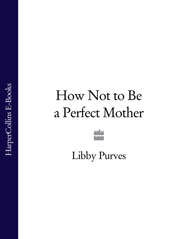
Полная версия:
How Not to Be a Perfect Mother

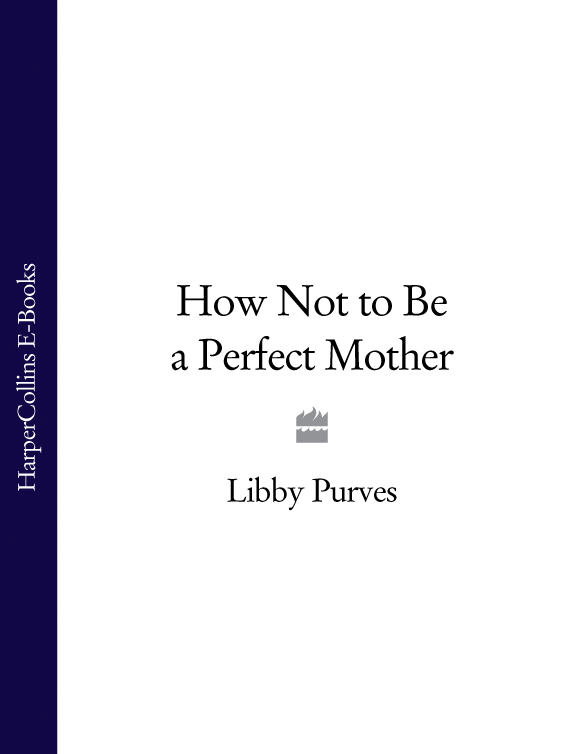
Dedication
To my children, and Paul
Contents
Cover
Title Page
Dedication
Preface, 2004
Introduction
1. Pregnant, Proud and Panic-stricken
2. Hard Labour: Birth
3. Basket Babies: Infancy
4. From Bundle to Vandal: Bigger Babies
5. The Leaving of Little Ones
6. Double Shift: Working Mothers
7. A Tale of Two Nannies
8. Toddlers and Tornadoes
9. The Second Lap: Siblings
10. High Days and Holidays
11. Last Word
Index
Acknowledgements
About the Author
Other Works
Copyright
About the Publisher
Preface, 2004
I wrote this book because 20 years ago I needed to read it, and it wasn’t there. Contemplating my new son in his hospital cot, or struggling with his wakefulness during long, long nights, I wanted a book that acknowledged that I had feelings, too. I wanted someone to admit that perfection in motherhood is impossible, that not everything can be planned or scheduled, and that to get through the day with an infant all you need is love – which comes pretty easily to most of us – commonsense, good-humour and a great deal of rat-like cunning.
There were a lot of perfectionist baby-books around at the time, focused (understandably) on the needs of the child and frankly rather careless about the parents in charge. So, during the turbulent years while I had two children under three, I made notes. When I began writing, with the youngest in a basket under the table and the eldest rampaging round on a plastic Thomas the Tank Engine which took lumps of plaster off the kitchen wall, I was still in the thick of it, on the front line, hunched over a typewriter at the kitchen table. But I knew that I didn’t know it all, because we all lead different lives in different styles. So I began by circulating a rather tatty questionnaire round 50 mothers I knew. They were of different ages, types, incomes and generations, but all of them were women who seemed to me to be doing, or to have done in the past, a pretty good job of it.
I just asked how they handled the daily round – bathtime, tantrums, feeding, dressing, sleep, biting, the lot. Their answers were magnificently diverse, cheerful, fond, resigned and occasionally a bit bizarre. They encouraged me greatly. So I wrote this book, and launched it off into the world in the hope of sharing that encouragement and pleasure with other mothers. To my amazement it has never been out of print since, and has been translated into a dozen languages. Babies, clearly, are an international language. They do not change with passing fashions.
However, the century has turned and now the time seems ripe to examine and revise How Not to Be a Perfect Mother. Above all, baby equipment has changed: there were points that needed updating (when did you last see a carrycot?). In some ways the attitude to mothers has changed as well. In the early 1980s a baby was not yet the designer accessory it has become since. Film stars did not push buggies around where cameras might see them. Now that Rachel-from-Friends and Miranda-from-Sex-in-the-City brandish babies in fiction, and Madonna Ritchie and Catherine Zeta Jones are photographed toting infants with all the carefree style of pashminas or Prada bags, there is a new and different pressure. You may fall for the dangerous illusion that it is possible not only to be a perfect loving mother – and probably a worker too, for some of the time – but to remain chic and soignée as well, fit for a Hello! magazine spread. And that is just as much nonsense as the old idea that a grown-up busy working girl would mutate into a calm, milky household angel by the mere fact of giving birth.
Contemplating all this, it seemed a good moment to revise the book a little. I have not changed much, except a few tenses and some advice on modern equipment, because the essence of the original How Not to Be a Perfect Mother was that it came straight from the coalface of practical early motherhood. There is nothing more irritating to the new mother than being given sanctimonious advice by some middle-aged woman who gets enough sleep and whose children are big enough to be sent up ladders to fix bits of loose guttering. So I have tried to leave intact the original tone of the book, even when it verges on the mildly hysterical.
But I would also like to take the opportunity to say that the friendships and contacts I made in the years after this book was published have – however brief and fleeting some of them were – meant a great deal to me. This book has become, across ages and backgrounds and some national borders, a kind of club. We look one another in the eye—having met perhaps in some quite different context – and both say, ‘Yup. That’s how it was. That’s how it is, and always will be.’ The extraordinary, taxing, inspiring, despairing, exhausting and energizing experience of having a baby and caring for it through the infant years is something no mother ever forgets. And not many fathers, either. To all who went through it alongside me, and have shared the experience since and nodded in recognition of the way this book told it, I am happy to dedicate this new edition, with real love. And, as we say these days, respect!
Introduction
A mother’s duty is quite clear: it is to be perfect. Mothers, as we all know, are sacred. They are sweet, loving, caring, self-denying madonnas. They are always there. They have tender bosoms and endless patience. A mother is like the legendary pelican, ripping her own breast to feed her young. Any mother would lay down her life for her child …
Well, yes, true enough. I am a mother, and I would lay down my life for my children; but I see no reason to do it every single day. Under the mantle of every mother lies an ordinary, disgruntled human being: there is no special saint-factory churning out tranquil and self-sacrificing madonnas. Every carefree, adventurous, selfish girl-in-the-street is at risk of being conscripted to wear a mother’s halo. And the transition from healthy adult selfishness to the status of maternal angel can be a painful one: rather like a butterfly trying to climb back into the chrysalis. It is that transition, in the early years, which is the subject of this book.

Nature helps the process along: in the first days, the urge to perfect pelicanhood is strong. When a baby is born, the average woman becomes chronically unselfish. The infant lies there in a plastic hospital cot, hypnotizing her with its beady blue eyes; and although she hurts all over and her head is still spinning, her baby’s willpower can bend her exhaustion to its demands. It sucks busily, works out its own sleeping schedule with reference to nobody, wets its nappy whenever it feels like it, and feeds eccentrically – three times an hour and then not for ages. Place any small obstacle in the path of the baby’s inexorable will and it will scream at a pitch carefully programmed to exact immediate maternal obedience. It demands conversation at midnight but falls rudely asleep in the middle of Granny’s best nursery rhyme; a baby has no manners, no consideration, and no responsibilities. It just gets on with growing bigger.
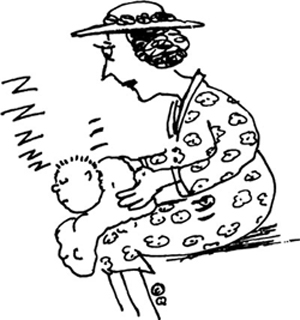
Confronted by this tyrant, you drop everything and swim with the tide, serving the baby and forgetting that you ever had preferences of your own. At first, this makes good sense; for a few months after a birth, nobody should expect much beyond survival and the odd quiet drink in front of the television. The problem is that the habit of self-obliteration tends to carry on for too long, reinforced by the sentimental picture we have of motherhood. Sometimes, the reasonable doctrine of ‘demand feeding’ continues unreasonably for 18 years, and widens to embrace demand washing-up of teenage midnight feasts and demand lending of the family car every Saturday night. Even in the early days, we overdo the sacrifice: we leave the house on freezing days with the children wrapped like Eskimos, but too preoccupied to put on our own coats. We stop every conversation five times a minute to wipe noses and respond to insistent little voices at knee-level; we walk miles in blizzards to buy finger-paints (well, I did, once). After a few years of this, we end up dressed like bag ladies and apologizing to everybody. For the most extremely unselfish mothers, the ones with no pleasures of their own, are often the ones who feel most guilty and depressed.
There is enormous pleasure in being a parent. It is fun to watch a baby grow, and smile and talk and begin to invent mad private games with bits of old hosepipe and buckets of sand; but it is also cripplingly hard graft. It is inescapable work: even professional nannies and nurses, when their own first babies are born, have been reduced to tears by the realization that now there will be no days off. A mother’s working day can stretch to 18 hours or more if she lets it.
But why should we let it? If there are corners to cut, which hurt nobody, why not cut them? Why not bend the baby to your own convenience every now and then? May not a saint put her feet up with a beer and a book occasionally?
This book is about the way real, fallible mothers really get through the day. There are plenty of technical baby manuals on the market: some are excellent, some manage to make bathing a baby sound as complicated as stripping down a MIG fighter engine; nearly all of them are perfectionist in tone. This is an imperfectionist book, about the cheerful cutting of corners, without guilt.
Of course you have to look after babies and small children properly. It is hard not to, when every whimper of fright or trembling lip can strike you with agonized sympathy. But with a bit of low cunning, you can win a part of your own life back, and do the child no harm. Squaddies in the army have always understood this principle: the war has to be fought, and possibly your life sacrificed, but in the process you can work the system, sneak the extra chocolate into your knapsack, and get a kip behind the cookhouse while someone else peels your load of potatoes. You stop short of treason or desertion, but there are always rules to bend.
From madonna-and-child to Sergeant Bilko is a bit of a comedown for your image, perhaps; but it is much easier to live up to, and considerably more fun. Sometimes, as Bilko, you actually do the same things that the perfectionists would have you do, but for slightly different reasons. During the worst difficulties of early breastfeeding, when no theoretical benefit to the baby compensates for the pain, I kept myself going on the thought that the more breast milk I got down the baby, the less chance there was of having to nurse him through frightening baby illnesses. Or take discipline: I once watched two mothers at tea, both pestered by their toddlers. One kept saying: ‘Don’t touch the mug, darling, it’s hot, it might burn you.’ The other mother put it differently: ‘Don’t touch that mug, darling. It’s Mummy’s.’ I noticed that the latter one managed to drink her tea, fending the little beast off with her arm and defending her rights; whereas the former put her mug up on a nice safe shelf and never touched a drop. She left, tired and thirsty, for another gruelling bathtime of creative water-play and coaxing. I suspect that the more selfish and least ‘perfect’ mother (who, no doubt, used bathtime as a chance to paint her own toenails while the child splashed undisturbed) was the happier woman. And as for the children, I doubt whether it made much difference to them either way.
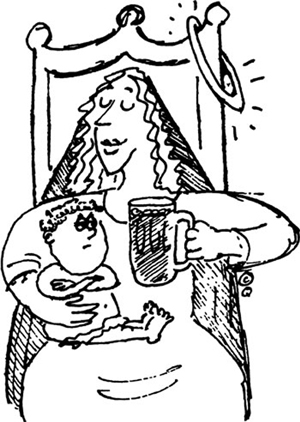
This book covers the first three years, or a little more, depending on your child. I have never seen the point of lumping ‘preschool children’ all together; it is the first three years which contain the maximum bewilderment and the fastest changes. A baby has landed, as alien as a UFO, as odd as a dream. Slowly he turns into something more like a human adult, and as the fourth year begins, he has travelled a long way towards it. You have, at three and a half, a small individual who can talk enough to be reasoned with, who knows (although he may not agree) that fair is fair and orders is orders. You are not forever having to coax him to lie on his back while you change nappies; he can communicate with strangers and eat with a knife and fork.
At this age, too, children become widely different individuals. Not that they aren’t individuals before three; but early on, the common qualities far outweigh the differences. All six-month-old babies grab the spoon when you try to feed them; all new walkers pull things off tables on to their heads; and the particular qualities of a two-year-old (not unlike a suitcaseful of gelignite on a bouncy castle) are pretty universal too. But after four years you may have acquired a tough gunslinger or a dainty Victorian miss (of either sex); an intellectual or an athlete or a socialite. They stand apart from one another, small but separate, each on a private platform of heredity and chance and conditioning. So a mature three seemed a good age at which to stop; it is also the period which I know best from my own life. To fill in the gaps and catch the great and ingenious variety of mothering styles, I consulted 50 friends, with 86 children between them. Some are of my generation, some older or younger; some working mothers, some housewives, some single parents. To all of them I am boundlessly grateful for their advice, confessions, encouragement and occasional reproofs.
One final apology. These days, writers have to tie themselves in knots trying to be fair to both sexes (back in the days of Truby King a baby was ‘he’, and that was that). Some writers say ‘he/she’ and ‘his/hers’ all the time, or else alternate ‘he’ and ‘she’ so that you get a disquieting impression of a running sex-change; some bravely confess that since theirs are all boys or all girls, they will stick to the sex they know best. Nobody dares to say ‘it’ any more, even of a foetus, lest the mothers should be mortally offended.
I have one of each sex, myself. And after much thought, I have decided to use he, she and it indiscriminately and according to my mood. I hope it does not annoy you too much. After all, nobody’s perfect.
Chapter One
Pregnant, Proud and Panic-stricken
When I was first pregnant, and prone to describe every last flutter and twinge to everyone I met, I went to lunch with a friend who already had a couple of children under two. I sat in my circular splendour, hands folded on my vast bump, while she mopped and wiped, and caught toppling high-chairs, and embarked on wild, hopeless lines of reasoning about Teddy eating up his carrots and the discarded rabbit-slipper not wanting to sit in the milk-pan really. For the first time, at that moment, it occurred to me that pregnancy is a lousy sort of preparation for motherhood.
When you are pregnant, you buy new clothes, think about your diet, avoid lifting, put your feet up, and dwell endlessly on every gripe and swelling of your precious body. You attend classes about your internal organs, watch your fingers anxiously for signs of oedema, and are told to feel proud of yourself. Once the baby arrives, what happens? You never get your feet up, you live off discarded Marmite soldiers, wear old shirts covered with sicked-up banana, and have to lift a great lump of a baby around all day.
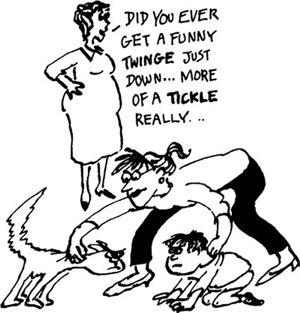
As for the precious internal organs, you would hardly notice if you got appendicitis; and nor would anyone else. All that pregnancy really prepares you for is the birth – which, however tough, is basically an event at which you are the centre of attention. People put pillows behind you, and everyone keeps saying how well you are doing (‘Six centimetres dilated! Well done, Mum!’). You never think of preparing for all the years after these exciting few hours, when you are just the harassed rag-bag in the background to your baby and when – far from telling you how well you are doing – the world blames you squarely for every spot, bruise, tantrum and beer-can thrown off the Millwall terraces. There do exist a few classes labelled ‘Education for Parenthood’, but none which includes running a commando course through a maze of weaving sit-on buses, carrying a bowl of apple slime, answering mad questions, and never once taking your eye off the tense dialogue between the two-year-old and the cat.
Women who already have children, like my friend, have little patience with the processes of other people’s first pregnancies. I remember offering a magazine editor my emotionally acute ‘Diary of Nine Months’ and explaining how fascinating it was that while I started out by feeling vulnerable yet protective, by the third month I felt, well, sort of protective yet vulnerable; and how useful airline sick-bags were on the Underground. Editor had a child of her own, so her eyes glazed over a bit; but she gamely agreed to print this rubbish. However, by the time I got around to finishing it, my son was born and I, in turn, could not see what all the fuss had been about.
So it is with some diffidence that I offer a chapter on pregnancy and its problems. I can only say that, at the time, they seemed as enormous as I was.
The most useful side-effect of being pregnant is the Cousin Elizabeth complex (see Luke 1:39–41!). This is an overwhelming urge to visit other pregnant women and compare notes. It makes you some very good and useful friends, who you are going to need later on. And women in waiting together invariably become horribly intimate; we tell one another the most amazingly frank things about our various membranes and urges, as if preparing for the utter shamelessness of the maternity ward. (In a postnatal unit, if a TV repairman walks in wearing a white coat, half a dozen novice mothers start ripping at their clothing and trying to discuss their nipples, piles and stitches.)
Since encounters with actual mothers tend to bring on the sort of shamefaced guilt that I felt during that chaotic lunch with the two babies, other newly pregnant women are essential if you want company in which to discuss the various exciting developments under your smock. You can also share your innocent idealism about children, which for some reason seems to enrage people already toiling at the coalface of motherhood. If you plan to give birth standing up, to the sound of Mozart, or underwater with a Radical Midwife standing by with raspberry-leaf tea, you can ramble on about your ‘birthing’ theories to your Cousin-Elizabeth friend. If you plan to stimulate your newborn to genius with flash-cards and breastfeed for five long years, fine; tell her all about it. If you have visions of perfectly ironed flounces surrounding a delicate cradle, set in a flowery room lined with shelves of terry nappies as white and soft as swan’s down, tell her about that, too; and have nice little chats about fabric-softener. Argue with your friend about nannies, about state education, the importance of surrounding the child with Art, the morality of ‘Red Riding Hood’. Smile radiantly at everybody, dream your dreams; say how disgusting the title of this book is, and plan a life of serene self-sacrifice. You will be down here with the rest of us soon enough, learning mother-cunning. Welcome.
Meanwhile, there are the ailments and irritations of pregnancy itself to deal with. It is a bit like being hijacked, or having squatters in. You suddenly have an important, vulnerable, determined little passenger, curled up comfortably in there, shoving your stomach and bladder hither and yon, taking what it needs without a by-your-leave. You, for instance, will get seriously anaemic before the baby runs short of iron. As to food, healthy babies have been born to half-starved mothers. The baby is in charge. All you can do is to make sure that it isn’t forced to have anything it shouldn’t, like cigarette smoke, alcohol or drugs. With every new research document, these indulgences grow harder and harder to countenance; no sooner has one lot of gloomy doctors concluded that ‘even one glass of wine a day’ may damage a foetus, than another lot wades in with the conclusion that the unborn ‘flinches and squirms away’ when a mother even allows the thought of a cigarette to cross her mind. There are books more medical than this to persuade you one way or the other. All I offer is my own selfish reasoning: it kept me down to a couple of glasses of wine a week and not even a single paracetamol for two lots of nine months. I just used to tell myself that this baby had to be born exceptionally big and strong and shockproof, because it was going to have a less than perfect mother. This tactic worked. Every drink turned down, every additive-burger rejected, seemed like a form of insurance against having a fretful, sickly baby later. I could not defend this line of reasoning in court, but it kept me perfectly happy and abstemious through two pregnancies.
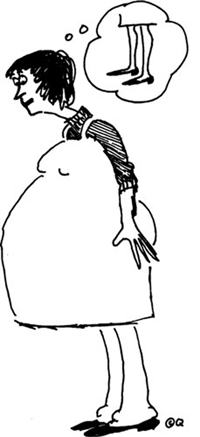
Coming off the booze and cigarettes, however, is a mild problem. Other physical matters are more intrusive. (The only merciful dispensation of providence that I can remember is that just when your ankles have swollen so revoltingly that you can hardly bear to look at them, your bump shoots out so far that you can’t see them anyway.) Here are a few comments and a few cures for the ailments of pregnancy:
Antenatal clinics
It may seem odd to list a clinic under ‘ailments of pregnancy’, but after a couple of routine antenatals in a big hospital, you will see why. However good a hospital is about the actual birth, the odds are that its clinic is terrible. Appointments are made in great batches, all for the same time, so that mothers (even with sad, wailing toddlers) sometimes have to wait several hours after their official time. My personal best is 2 hours 55 minutes. Even then, all that may happen is a blood test, followed by another long sit, followed by a urine test and a hop on to the scales; then another sit, and a desultory chat with a student midwife. Incidentally, it pays to learn the belts of the nurses on your first visit: students, junior and senior midwives have different colours. Do not waste your valuable time asking some 18-year-old student questions; grab someone with a belt that has been earned.
On my first-ever visit, I sat bursting with anxious questions while the ‘booking form’ was laboriously filled in by a very junior nurse indeed. She asked severely, ‘Right. Now. Contact with dates? Have you had contact with dates?’ Dates? Dates! My God, I thought, they’re not toxic, are they? Dates don’t produce abnormalities in foetuses? I remembered the panic about the green potatoes a few years before. And I had eaten stuffed dates only the week before! Oh, no! ‘Contact with dates?’ repeated the child, pencil poised, obviously writing me off as one of the poor dim underclass mothers they teach you about at training school. ‘Well?’ Recovering my balance, I snatched the form off her and read: ‘GERMAN MEASLES (RUBELLA), CONTACT WITH: Dates:’. She had missed a line. These encounters do little to soothe the nervous primagravida.

